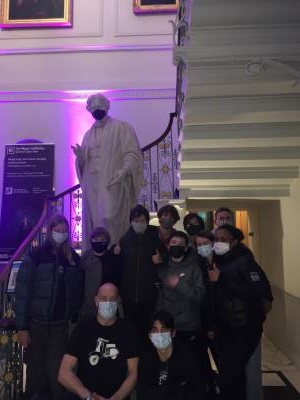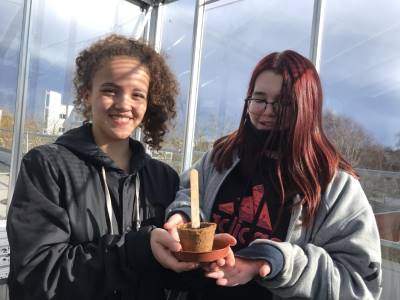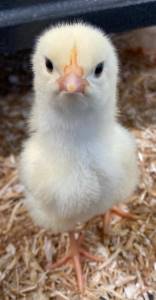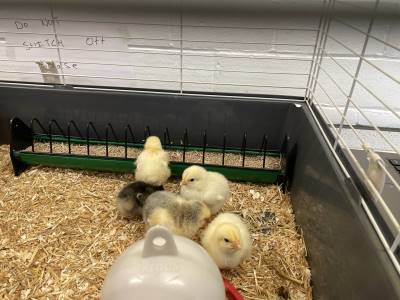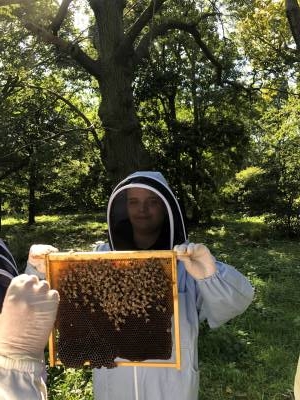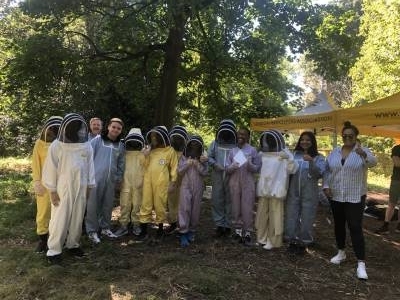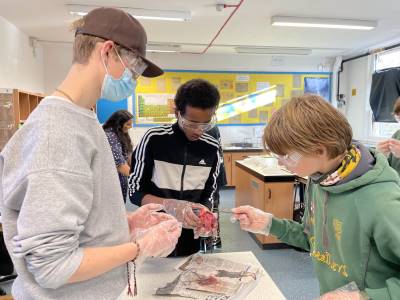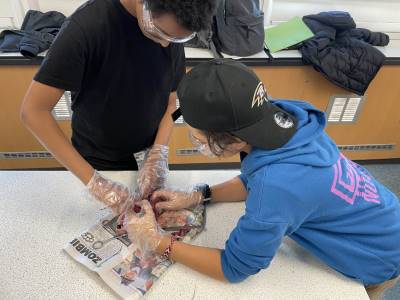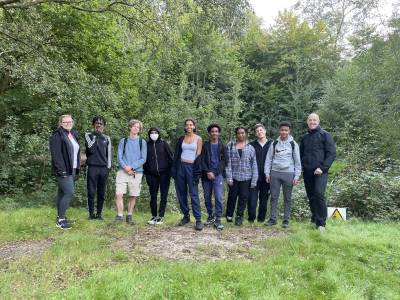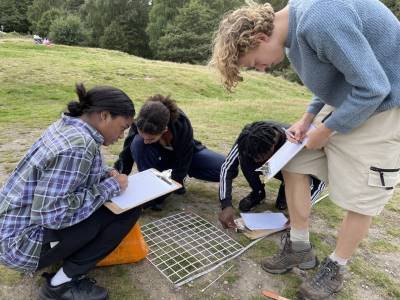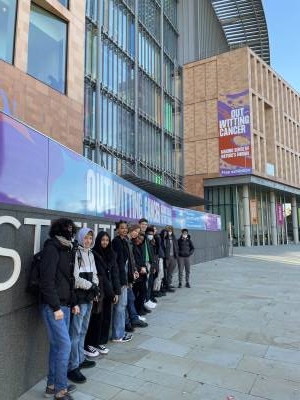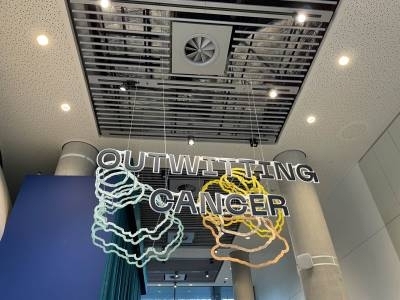Science
Science and everyday life cannot, and should not, be separated.
Rosalind Franklin
Scientific ideas give young people powerful ways of seeing the world. Through understanding the relationship between the scientific concepts and the nature of how they became established, students gain an appreciation of science as a discipline of inquiry. Engaging with their inquisitive nature about the world, students start to question things, and it is through questioning that we solve problems and advance our understanding of the world around us.
Delving into the big ideas in science stimulates students’ curiosity and helps them to make connections between concepts, disciplines, and the macroscopic and microscopic. Students are supported to acquire knowledge about scientific concepts, a necessary part of learning about science, as well as how to recognise, describe, and apply the acquired knowledge to explain abstract phenomena. Throughout this process, students learn how to work collaboratively, be persistent and stick with difficulty, and become disciplined to develop expertise in the subject. This allows students to experience positive emotions of success and wonder that learning scientific ideas brings.
The curriculum map below shows how students build upon each big idea in science as they progress through their secondary education.
Head of Faculty
R Green | rgreen65@aclandburghley.camden.sch.uk
Second in charge
R Stainsby | rstainsby@aclandburghley.camden.sch.uk
Subject Lead
S Mohamoud | smohamoud@aclandburghley.camden.sch.uk (SL)
Lead Practitioner
S Jibril | sjibril@aclandburghley.camden.sch.uk (LP)
Teachers
S Ali | sali2@aclandburghley.camden.sch.uk
H Arunagiri | harunagiri@aclandburghley.camden.sch.uk
F Islam | fislam@aclandburghley.camden.sch.uk
S McHugh | smchugh@aclandburghley.camden.sch.uk
A Shufflebotham | ashufflebotham@aclandburghley.camden.sch.uk
B Masalovich | bmasalovich@aclandburghley.camden.sch.uk
A Hassan | ahassan@aclandburghley.camden.sch.uk
L Morrison| lmorrison@aclandburghley.camden.sch.uk
L Oteng | eoteng@aclandburghley.camden.sch.uk
Y11 revision resources
1. GCSE Topic Checklist + Exam Dates 2025
2. GCSE Revision Resources + Past Papers
3. GCSE Science Practical + Maths Skills Booklet
Required Practical Exam Practice
Science gallery
Curriculum
KS3
Curriculum Intent and Map
Science is a discipline dedicated to explaining the natural world by the analysis of observations made either through our senses or by using specialist equipment. Scientific ideas give young people powerful ways of seeing the world. The KS3 science curriculum is built around the big ideas of Biology, Chemistry and Physics. Throughout year 7 and 8 students study the powerful ideas, understanding the relationship between scientific concepts and the nature of how they became established. Students use this knowledge to make connections between scientific concepts, ultimately engaging with their inquisitive nature to answer the big questions. Their answers become more sophisticated and meaningful as they develop their scientific understanding, setting a solid foundation to build on during the GCSE course.
Y7
Autumn term:
How do we make theories about things we cannot see? (How science works and the particle model of matter)
Why don’t bacteria have lungs? (Cells to systems)
Spring term:
In space, can anyone hear you scream? (Waves)
Why are offspring similar but not identical to their parents? (Reproduction)
Summer term:
What happens to the wax when you burn a candle? (Chemical reactions)
How did planets form? (Forces and Space)
Y8
Autumn term:
Have the carbon atoms in the air once been part of plants and animals? (Digestion and energy transfers through ecosystem)
Are cars and organisms made from similar or different stuff? (Periodic table and separation techniques)
Spring term:
Why is it important to conserve energy resources if energy can’t be destroyed? (Energy, forces and motion)
How did giraffes get their long necks? (Genetics and evolution by natural selection)
Summer term:
Why don’t birds resting on powerlines get electrocuted? (Electricity)
How are we changing our planet? (Earth and atmosphere)
Y9
Y9 Science Exam revision sheets
Autumn term:
Cell structure, division and transport
Atomic structure and the periodic table
Spring term:
Energy stores, transfers, and calculations
Digestive system and enzymes
Summer term:
Particle model of matter
Reactions of acids and metals
Ecology
Extra-curricular activities and clubs
KS3 Science club: Thursday lunchtime in S2
Science film club - Monday lunchtimes in S4
Science homework club: Tuesdays 3.30pm in S7
KS4
Curriculum Intent and Map
After students have met each big idea in KS3 through exploring the powerful questions, they continue to engage their curious minds in KS4 in order to develop their understanding of the world around them, and develop their expertise in the subject. At this stage in their science education students are really encouraged to be persistent and stick with difficulty, not only to master the concepts they meet at GCSE, but also to develop their ability to use existing knowledge and skills in later life to navigate unfamiliar problems.
In Years 10 and 11 students follow one of two pathways:
- Combined Science GCSE (AQA): students study Biology, Chemistry and Physics and are awarded two grades (9-1).
- Separate Science GCSE (AQA): students study Biology, Chemistry and Physics, and are awarded three grades (9-1).
Both pathways involve a set of required practical activities which are assessed in the examinations at the end of Year 11. Students are assessed on how well then can demonstrate and apply their knowledge and understanding of scientific ideas, enquiry and techniques and procedures, as well as how they analyse information and ideas to: interpret and evaluate; make judgments and draw conclusions; develop and improve experimental procedures.
By the time students leave Year 11, we aim for them to have become disciplined and developed scientific expertise. This is facilitated by the sequencing of substantive and disciplinary knowledge in both pathways, which allows students to address and build upon their current understanding of each concept and their views of the world.
During this process all students enhance their science capital and become scientifically literate citizens, and for many students, an interest in pursuing science in further education is sparked. Our teaching and learning framework allows these students to develop their knowledge and skills in the subject so that they can transition smoothly to any scientific pathway they choose.
GCSE Subject Specification
Please click through to the links to view more information on the AQA website.
Combined Science - AQA Exam Board
|
https://filestore.aqa.org.uk/resources/science/specifications/AQA-8464-SP-2016.PDF |
Biology Separates - AQA Exam Board
https://filestore.aqa.org.uk/resources/biology/specifications/AQA-8461-SP-2016.PDF
Chemistry Separates - AQA Exam Board
https://filestore.aqa.org.uk/resources/chemistry/specifications/AQA-8462-SP-2016.PDF
Physics Separates - AQA Exam Board
https://filestore.aqa.org.uk/resources/physics/specifications/AQA-8463-SP-2016.PDF
Y10 Combined Science
Autumn term:
-
Bonding, structure and properties of matter
-
Atomic structure and radioactivity
-
Circulatory system, disease, and defence
Spring term:
- Rates of Reaction
- Bioenergetics – respiration and photosynthesis
- Energy changes and organic chemistry
Summer term:
- Waves
- Earth’s atmosphere and using the Earth’s resources
Y10 Separates Science
Autumn term:
- Biology: Cell biology, Levels of Organisation
- Chemistry: Atomic structure and the periodic table, Chemical Bonding
- Physics: Energy, Electricity
Spring term:
- Biology: Infection and Response
- Chemistry: Quantitative Chemistry,
- Physics: Particle Model of Matter
Summer term:
- Biology: Bioenergetics
- Chemistry: Chemical Changes, Energy Changes
- Physics: Atomic Structure
Y11 Combined Science
Autumn term:
- Particle Model and Electricity
- Forces and motion
- Quantitative Chemistry
Spring term:
- Homeostasis and response
- Rates of reaction
- Earth’s atmosphere and using the Earth’s resources
- Inheritance, variation and evolution
Summer term:
Exam preparation
Y11 Separate Science
Autumn term
- Biology: Homeostasis
- Chemistry: Rates of reaction, organic chemistry
- Physics: Waves
Spring term
- Biology: Inheritance variation, evolution and Ecology
- Chemistry: Chemical analysis , Using Earth’s Resources
- Physics: Magnetism and electromagnetism , Space
Summer term
- Exam preparation
GCSE Support Materials
For Combined Science GCSE:
Grade 9-1 GCSE Combined Science: AQA Revision Guide (Higher or Foundation Tier) – contact the department to discuss which tier is most suitable.
For Separate Science GCSE:
Grade 9-1 GCSE Biology: AQA Revision Guide - Higher
Grade 9-1 GCSE Chemistry: AQA Revision Guide - Higher
Grade 9-1 GCSE Physics: AQA Revision Guide - Higher
For all students:
AQA Exam Practice Workbooks – choose Combined Science or Separate Science as appropriate
Useful links
BBC Bitesize for combined papers
BBC Bitesize for Biology papers
Links to past papers
-
www.aqa.org.uk/subjects/science/gcse/combined-science-trilogy-8464/assessment-resources
- www.aqa.org.uk/subjects/science/gcse/biology-8461/assessment-resources
- www.aqa.org.uk/subjects/science/gcse/chemistry-8462/assessment-resources
- www.aqa.org.uk/subjects/science/gcse/physics-8463/assessment-resources
Useful websites
- Weekly SPARX homework and independent study: https://sparxscience.com/
- COGNITO video lessons, quizzes and past papers: https://cognitoedu.org/home
- Seneca learning (filter by AQA and either Combined Science or the separate sciences)
KS5
As part of the wider LaSWAP consortium, Acland Burghley offers the following A Level/Level 3 courses.

